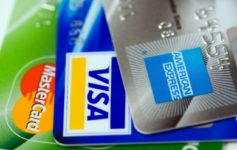I was reminded again last night that signing the back of your credit card remains a way of life in Europe.
It was a dry Christmas in Southern Germany, but we finally were hit with snow and I took my family up to the mountains yesterday. I stopped for some fuel on the way back and ran into a familiar situation.
After pumping the gas, I went inside to pay by credit card. As usual, after the credit card was processed the clerk handed me a receipt to sign while simultaneously pulling my card out of the reader and flipping it over to compare my signature on the card to the one on the receipt.
But my card was unsigned. As a rule, I do not sign cards.
I was prepared though. Before I even sign I pull out my Driver’s License (which is not a valid ID in Germany) and set it down next to the receipt as I sign. The card includes my signature and always does the trick. After many years, I realized this was easier than explaining why I don’t sign my cards.
I’ll never forget the first time I traveled to Germany. It was over 12 years ago and I was just a naive teenager at the time. I handed over my credit card at a gas station and the lady asked why it was not signed.
“We don’t sign credit cards in the United States,” I said.
“This isn’t America…” was her curt reply.
Touche.
She forced me to sign my card on the spot. I should have just showed her my passport or military ID.
The reason I refuse to sign credit cards is simple. If someone steals my credit card, I also don’t want them to have my signature. Even though I am technically not responsible for any fraudulent charges, why make it easier for someone to steal my identity by getting ahold of one of my credit cards?
CONCLUSION
Germans are big on formalities. If you try to enter Germany with an unsigned passport, it is deemed invalid and you face a hefty fine (so does the airline). But in the case of credit cards, just have a form of ID handy that includes your signature. I strongly recommend against signing any of the cards in your wallet.
Credit card companies are already solving this issue for us with chip-based security and PIN codes that will (hopefully) will eventually replace the need for signatures.
> Read More: Your Driver’s License is not an ID Card!





I agree, but the best thing to do is write “See ID”. Cashiers don’t check 99.5% of the time, anyway, and they are not signature experts even if they do. So I’ll argue that “See ID” is more secure than both signing and not signing.
IIRC, you must sign the card for it to be valid. An unsigned (or otherwise marked) card is not valid for payment. Moreover, it is “illegal” for the merchant to require any additional ID beyond the signed CC.
With that being said, I never sign mine.
So “See ID” has some interesting challenges too. Multiple times in Hong Kong, I have signed a credit card receipt but cashier wasn’t happy because my signature wasn’t “See ID”. As a result, I’ve had to sign “Sign ID” as my signature quite a few times.
I agree – you need to write “SEE ID” on the back of the card or something to that effect. If you just leave it blank, anyone that steals your card can just sign your name there, and is free to use it at will.
Nope. Never. Though in my case it’s not an intentional thing; I just forget to do it and then never get around to it.
Thanks for the tip, though. I’ll have to remember to carry my passport on me on my trip to Germany. And I guess I better double check that it’s signed…
@Sexy_kitten is correct. Unsigned credit cards are invalid in Europe. Normally that’s a technicality as signatures aren’t normally required and normally it’s not acceptable for the clerk even to touch a customer’s card. But because American cards don’t work normally, a signature is required so everyone has to revert to old fashioned ways of doing things.
That said it strikes me as far more worrying having the waiter take my card away with him or her than it is to have my signature on the back of a card.
The way around this is to use Apple Pay, which is slowly gaining ground here in Germany.
Based on my experience living in Germany in 2018, US phones/cards work better with Apple Pay in Germany than German phones/cards. Many retailers would say the tap function doesn’t work for phones, and were surprised when my Apple Pay worked.
Perhaps they were just trying to discourage credit card use like all German retailers.
I read your opening “It was a dry Christmas in Southern Germany,” as meaning you had not had a drink in some days.
Uhmm, signing the back of your credit card isn’t a way of life in “Europe” (Germany, especially wrt credit cards, really is a place of its own), it’s not even so with European cards (I presume yours is a US card). We have chip & PIN over here, signed slips haven’t generally been a thing for over a decade. Absent chip & PIN, which American cards tend not to incorporate (or they don’t usually work properly in Europe, and vice versa), checking the signature against the one on the back of the card sounds legit. Also, note that, as others have pointed out, an unsigned card is invalid this side of the pond. But even then, it’s chip & PIN that is a way of life in Europe, if anything: contactless is now the norm, where a PIN isn’t required for low-value transactions.
I never sign my credit cards. Reason: it hopefully forces the cashier to ask for my ID. If my card is stolen the thief wont have my ID and the transaction may not proceed.
Actually we do sign cards in the USA. You may not and others may not, but the T&C of the card companies state that an unsigned card is invalid. Many cards used to have a notice on them that said, “Not valid if unsigned”.
Your argument about identity theft is weak. If you do not sign or you write see id, I can simply make a fake ID rather quickly and the signature that I put on the ID will be my signature and match perfectly, even if it is a made up signature and name. The merchant will not know any better. They cannot identify a fake id if it is a foreign to their area ID.
At least with a signature on the card in a permanent marker, there is less chance they can match my signature enough to fool the merchant. YMMV
Quit signing my cards 10+ years ago after they used to wear off when I used the credit cards to pay for gas at the pump. I doubt anyone can fit their “true” signature into the tiny space provided on the back of cards anyway. I’ve always thought a great solution to the signature on credit cards would be for the card companies to laser print the signature onto the back. You could provide this on a slip of paper to the company which they could then scan. Perfect way to get your actual signature onto the back and not just a scribble.
When I visit Poland, if anyone makes a fuss over my cards not being signed I just show them my California Drivers License. Problem solved. Well except for that crazy lady at Auchan who still wasn’t happy!
As part of a social experiment, I didn’t sign my last round of credit cards. I use them all the time as I rarely carry cash. I can count on one hand how many times I’ve been asked to show other ID. Many times the clerk will turn it over, see no signature but never ask for any verification. Conclusion: the signature is pointless and provided no security.
Total Wine requires a signature to buy anything and it drives me crazy..
I never understood the logic of purposely not signing a credit card. If you do not want someone to have your signature, what is stopping them from signing your name in their handwriting on your card? It is also not hard so copy a signature close enough to be passable. My signature looks like chicken scratch. I have heard of see my ID, but never practiced it because, ultimately you are not liable, so it doesn’t matter to me if they charged $5 or $5000.
Hmmm, I don’t remember when I last time signed anything with cc in Europe, being European and not having visited Germany for a while, Must be years ago..
To those saying they don’t sign… a thief will sign the stolen card with their own handwriting giving them a perfect signature match each and every single time… it is much harder to forge a signature than it is to sign another name in their own handwriting. As a merchant when I explain this 90% of customers sign their card on the spot without even being asked. Granted this was back when we touched the card. Nowadays merchants don’t see or touch the cards anymore. Even places that do like restaurants don’t get to compare signatures before a customer leaves.
Chip and pin is the way ahead. India has made chip and pin mandatory for debit cards as well wef 1/1/19.
Mag stripes and signatures are such a backward way to do things
I find both of the premises in this post extremely odd or just plain incorrect. Actually a lot of us in the US do sign our cards, and I think the argument about identity theft is ridiculously weak. As others have pointed out, a thief would sign your unsigned card and be able to use it without question nearly anywhere. The reason your cards are not valid until signed is precisely to try and prevent this, and it could potentially make recovering fraudulent charges from the credit card provider more difficult when they realise you left your card unsigned.
Secondly, it’s comical to think signing cards is a “way of life” in Europe since no one ever uses signatures anymore there – chip and pin was introduced decades ago, and these days most transactions are contactless. It’s only When using US cards, whose technology has lagged years behind in this area, that they need to check for signatures in Europe.
I meant way of life for U.S. travelers.
I have a credit card from State Department Credit Union that is a true chip and pin (and earns 2%). I like using it overseas and here in the US as I don’t have to sign and it usually surprises a merchant when a signature is not required.
So here’s a question. All my credit cards now have chips. Why don’t these chips function the same away as European chips.
I think it must have something to do with the bank/financial institution that issues the card. Mine all have chips also, but the State Dept one is the only one that prompts for a pin and no signature.
Because America
American chip cards function (quite well I might add) as chip and sig. But almost none are chip and PIN like in Europe. The big banks were too afraid of ticking us off by making us remember more PINs. They thought the barrier to use would be too high and they were probably right, given all the headaches chips alone caused! As companies see all the time, if they make it too hard to use your account (password reset, 2FA, security questions), many customers just give up and you lose business.
I am not aware of any push (from the consumer or business side) to implement American PINs.
I work for a place that routinely deals with card transactions in the amount of hundreds of thousands a day. Policy always is that unsigned cards are not valid and are returned until signed. Your credit card requires it and honestly nobody really cares about copying your signature. I personally deal with tax paperwork where people’s signatures consist of an X.